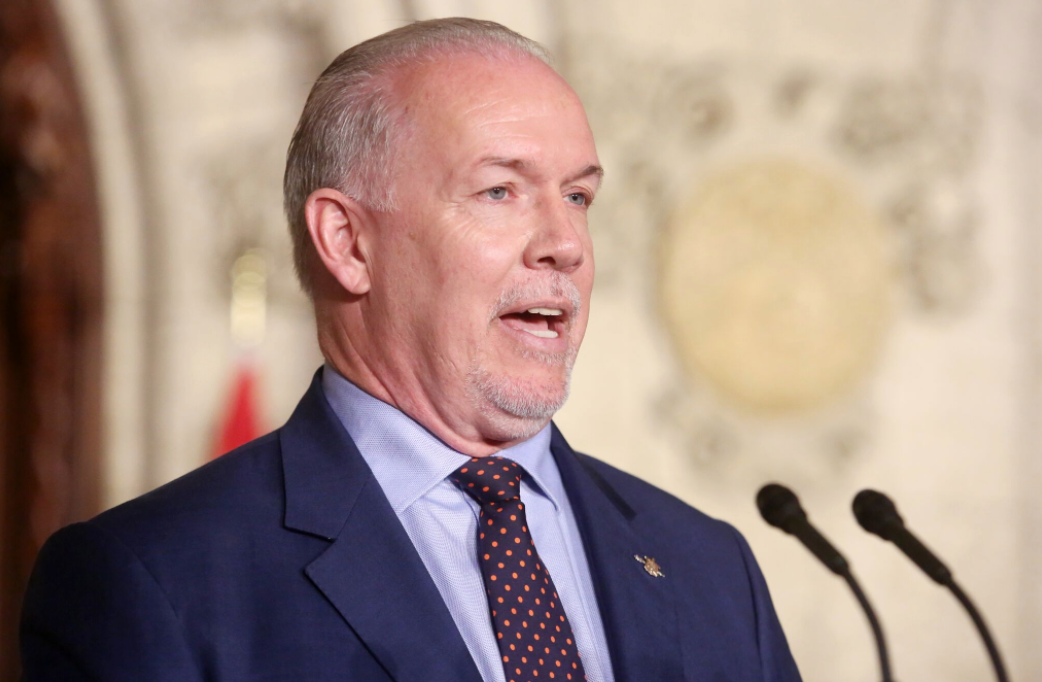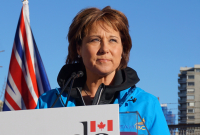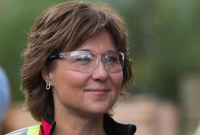Support strong Canadian climate journalism for 2025
British Columbia's New Democrats are expected to use this week's throne speech to broadly outline how they intend to follow through on their key election promise to get big money out of politics.
But so far details have been scarce and a recent string of NDP fundraisers has at least one political observer suspicious the fledgling government may be getting cold feet about turning off the funding taps any time soon.
Hamish Telford, a political scientist at the University of the Fraser Valley in Abbotsford, B.C., said the New Democrats appear to be moving slowly on political fundraising reform.
"They seem to be kicking the can down the road," Telford said. "It is no longer, apparently, going to be the first piece of legislation."
Banning parties from accepting limitless donations from businesses and unions will handcuff the NDP, given their reliance on funding from labour groups, he explained.
B.C.'s reputation as North America's Wild West of political fundraising peaked in the lead up to the province's spring election, prompting the New Democrats and Greens to promise a clamp down.
The Liberals softened their longtime opposition to fundraising reform after the election failed to give any party a majority of seats in the legislature and paved the way for an NDP minority government.
Attorney General David Eby has been tasked with putting together the legislation to ban corporate and union donations, cap individual contributions and require that loans to political parties come from recognized financial institutions.
Eby said he expects to table legislation early in the new session but would not say what the individual limits will be or when the law will come into effect.
"My goal is for the bill to become law as quickly as possible so British Columbians can have confidence in our political system," he said in an interview, adding that this will be his first bill as attorney general.
The New Democrats should act swiftly to change the system, lest they be tempted to adopt the same "pay-for-play" rules with no limits on donations that the Liberals so effectively exploited over 16 years, said Max Cameron, a political science professor at the University of British Columbia.
"It is actually in their own best interest to tie their own hands and introduce legislation," he added. "Trying to drag this out is only going to make it more difficult in the future and will be a major betrayal."
But the man whose support is vital to the government's survival does not appear concerned about NDP inaction.
"(Premier) John Horgan said that this would be the first thing he'd bring in ... and I trust him to do it," Green party Leader Andrew Weaver said.
The Greens, who have three members in the legislature, agreed to prop up the NDP's minority government in a deal that includes a commitment for fundraising reform.
Still, Weaver is keeping up the pressure, calling Horgan a hypocrite for hosting a series of high-priced fundraisers, including a $500-a-head golf tournament.
"The NDP are trying to do the last final shakedown to get as much money in their coffers before this happens," Weaver said. "They're trying to pay off their debt. I get that."
But Eby said it is important to take the time to get the legislation right. Meanwhile, the New Democrats will play by the rules established by the Liberals, he said.
"We want to deal with this one time and to do it properly," he said.
In terms of limits, Weaver said he would be happy if B.C. adopted the federal model, which in 2017 restricts contributions to $1,550 for a constituent and $1,550 for a party.
At $100, Quebec has the strictest donation laws in Canada. New Brunswick's limit of $6,000 is the highest, but that will drop to $3,000 in the new year. There are no contribution limits in Newfoundland and Labrador, Saskatchewan and Prince Edward Island.
Robert MacDermid, an expert in campaign finance at York University in Toronto, said cracking down on donations is only one element of effective political finance reform.
Regulating third-party advertising and curbing donations to leadership campaigns are also necessary to prevent big money from sidestepping contribution limits, he said.
"There's little point in limiting what businesses can give (to a party) if we don't also limit what the third parties can give in the context of a campaign."
Introducing campaign spending caps as well as a party allowance, possibly on a per-vote basis, are other options MacDermid raised, which Eby acknowledged were being considered.
In an emailed statement, Liberal spokesman Shane Mills criticized the New Democrats for failing to provide many details and said the Opposition will scrutinize the bill for loopholes.





Comments
Section 15 of the Constitution says we are all equal. Thus we should all have equal opportunity to influence the outcome of an election. That is why we have one vote each. It is why donations should be limited to individual voters only, and limited to an amount just about anyone can afford. One can argue about the amount but somwhere in the range $50-$100 seems reasonable, with special provision for those who can not afford even that. This could be matched by the province (if you object to a public subsidy keep in mind that the present system provides considerable public subsidies through the income tax system).